Reviews
Billy Wilder
USA, 1948
Credits
Review by Anna Bak-Kvapil
Posted on 08 March 2011
Source Paramount DVD
Categories Brackett & Wilder
A Viennese period musical was a strange project for Billy Wilder to follow the delirium tremens of The Lost Weekend with. But The Emperor Waltz grew out of Wilder’s severe desire for escapism after his traumatic experience shooting the propaganda film Death Mills, a short about the liberation of the concentration camps. With The Emperor Waltz, he wanted to turn the clock all the way back to his childhood in turn of the century Vienna during the final, glorious gasps of the Austro-Hungarian Monarchy.
Scripted by Wilder and Charles Brackett, The Emperor Waltz, shot in 1946 and released in 1948, was among their last projects together (their partnership would culminate with Sunset Boulevard). In Talking Pictures, Richard Corliss offers two conflicting ideas about the Brackett and Wilder partnership; Brackett could be seen as “the resourceful private secretary to an immigrant never completely confident in his grasp of English,” but who also “acted both as a mellowing influence on Wilder’s effusive sarcasm, and as author of the important but underrated ‘bridging’ dialogue between Wilder’s Berliner jokes.” Perhaps Brackett had more influence on The Emperor Waltz than usual, because the acid pronouncements and cruel characterizations so endemic to Wilder are significantly toned down. But the script often recalls Brackett and Wilder’s work for Lubitsch, as in an exchange where one character tells another, “I met him in Budapest. Didn’t like him very much” and the other replies, “Nonsense. Since then he’s inherited half of Buda and a large part of Pest.”
Wilder’s first color film, The Emperor Waltz was shot in Technicolor on location in Canada’s Jasper National Park. With a streak of von Stroheim extravagance, Wilder had imported from California hundreds of daisies, painted blue to photograph well, and dozens of pine trees to gild the already spectacular scenery. Set firmly in Lubitschland, where refined courtesans dither and quaint villagers giggle in a European fairytale kingdom, the film appears to be a genuine homage to Wilder’s mentor. But Wilder, dissatisfied with the film, said later, “I would like to have done the picture as a tribute to Lubitsch. A tribute to Lubitsch it was not” (Nobody’s Perfect: Billy Wilder, A Personal Biography, by Charlotte Chandler). Although well reviewed and lucrative when it was released, The Emperor Waltz is usually left out of discussions of Wilder’s work. Examinations of his Lubitschean tendencies center instead around his 1957 May-December romance Love in the Afternoon.
Presented as a story recounted in flashback by the gossiping old Princess Bitoska at a ball, The Emperor Waltz concerns the puppy-obsessed Emperor Franz-Josef I of Austria, who wants Scheherazade, the purebred poodle of Johanna, the Countess von Stoltzenburg Stoltzenburg (Joan Fontaine), to mate with a royal dog so he can have canine company in his twilight years. Also at court is Virgil Smith (Bing Crosby), a New Jersey gramophone salesman attempting to gain the emperor’s seal of approval for his product. But when Scheherazade attacks Virgil’s mutt Buttons, Virgil is so offended that he demands a formal apology from Johanna. She refuses, on the principle that she and her dog are of a higher class and should therefore be apologized to, but Virgil demonstrates the permeability of position by kissing her. Virgil’s mellow singing voice turns out to have a hypnotic effect on Johanna (although the Princess Bitoska describes it as a “cheap bathroom yowl”), and they begin an affair that threatens to dissolve class boundaries. Scheherazade’s preference for Buttons over her royal consort complicates matters further.
Buttons and Scheherazade, onscreen for most of The Emperor Waltz, are highly skilled animals, mimicking vicious dog fighting, along with human emotions like romantic love and depression. Scheherazade must react convincingly to psychoanalysis, which she does by writhing around on her back on a couch and emitting high-pitched yelps (her analyst is played by Sig Ruman, the prolific character actor who appeared in Ninotchka and To Be or Not to Be). Buttons stares into the camera with the cold, focused gaze of a young Robert de Niro. The dogs are given disturbing things to eat, like chewing gum, sleeping pills, and whisky, raising the suspicion that neither Wilder nor Brackett ever actually owned a dog.
The underlying concern of the film is the difference between refined European aristocracy and upstart Americans. The Emperor tells Virgil, “I don’t think we are better. As a matter of fact I think you are better. You are simpler, you are stronger, ultimately the world will be yours….We are like snails living in lovely twisted little shells.” Because of this well-illustrated difference, it is hard to root for the romance between Johanna and Virgil. Joan Fontaine is so adept at endowing her character with good breeding that the thought of her in living in a New Jersey townhouse with Virgil’s mother is truly bleak.
As the Countess von Stoltzenberg Stoltzenberg (“That’s alotta Stoltzenberg, brother,” says Virgil), Joan Fontaine abandons the humble, cowering manner she assumes in Rebecca and Letter to an Unknown Woman. Here, she’s imperious, poised and condescending, her elaborate pompadour accentuating her Gibson Girl profile. Perhaps to distance the film from any Third Reich implications, she, along with the other nobles, speaks in plummy English tones rather than a German accent. Letter to an Unknown Woman was, oddly, released the same year as The Emperor Waltz, revealing Fontaine to be an excellent interpreter of fin de siècle Viennese ladies.
Perhaps The Emperor Waltz doesn’t feel like a quintessential Billy Wilder film because it is meant to be a star vehicle for Bing Crosby, whose charm now looks, like Betty Grable’s, a little dated. Crosby is so modest and unassuming that it’s difficult to remember that in the late 40s, he was one of the biggest stars in Hollywood, and could effortlessly draw a large audience to any of his films. For The Emperor Waltz, Crosby brought in his own personal writer, Barney Dean, to help his dialogue conform to his star image. While it is impossible to know specifically which lines Dean tweaked, some of the proud Americanisms seem too blatant to have come from Brackett and Wilder, as when Virgil explains to some challenging Austrians that he’s “A Presbyterian Shriner salesman…also a registered Democrat, a junior member of the chamber of commerce, and a sandlot third baseman.” And rather sickeningly, he repeatedly calls Johanna “honey countess.”
But Crosby’s refusal to act anything but plain ole meat and potatoes American doesn’t make the film any less Lubitsch-inspired. Crosby’s down home dialogue, in fact, recalls the Hecht-penned buoyancy of the Design for Living script, which used words like “cock-eyed” and phrases like “I’ve got the billboard collywobbles.” And despite Crosby’s script-meddling, some jokes are made at his expense, as when Princess Bitoska says he has “ears like a bat and the rest of him like a plucked duck.” In a moment that could have been lifted from Trouble in Paradise, Johanna tells Virgil, “I had a husband. He was suave and distinguished. He was dark and dashing. He was six feet two. He was the handsomest man in Austria. You’re so different.”
Yodeling makes up a surprisingly large part of The Emperor Waltz. As Johanna hears a faraway hooting, she says, with a straight face (how did Joan Fontaine manage it?), “Listen to that yodel. It’s the voice of Austria. Mountain-born, deep rooted, eternal.” In the “Friendly Mountains” musical sequence, Virgil hikes up a mountain road, yodeling to himself and dressed in full Von Trappian drag. As he sings, the mountains echo back select phrases of his song (it’s a fickle echo). Maids milking cows by their wood cabin yodel back at him until their beefy mother puts a stop to it. Austrian kitsch reaches maximum volume when Virgil looks down into a bucolic glen full of villagers yodeling away, as the men form a circle and perform a slappy boot stomping kind of dance, then continue on yodeling.
The Emperor Waltz misses an obvious opportunity by not having a waltz-themed sequence, like the glorious number in The Merry Widow in which a host of couples in uniforms and white dresses whisk around a ballroom, dramatizing the extravagant appeal of Strauss. Wilder was uncomfortable with musicals, and inserts numbers sparingly into the narrative. But the musical numbers that do exist are charmingly weird, as when a chauffeur is revealed to be a nimble little ballet dancer, and begins to whoosh a chubby innkeeper and a comely housemaid around in a dignified pas de trios. The best musical number takes place in a mountain town populated by fiddle makers, where groups of young girls in braids and old women in shawls, men in lederhosen, priests and firefighters, gather together to play their violins and cellos in the village square at the end of the day.
Despite a deeply silly plot and a generous length, The Emperor Waltz is never boring. Flawed and odd as it is, it has just as much to say about the difference between European and American sensibilities as Love in the Afternoon, and deserves a more well-regarded spot in the Billy Wilder canon. Andrew Sarris famously called Wilder “a filmmaker one likes too much and too easily to respect properly,” and the frothy likeability of The Emperor Waltz may explain the lack of respect it is accorded. Or maybe it just has too much yodeling.
More Brackett & Wilder
-
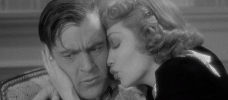
Bluebeard’s Eighth Wife
1938 -
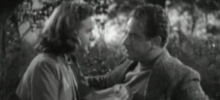
That Certain Age
1938 -

Midnight
1939 -
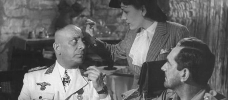
Five Graves to Cairo
1943 -
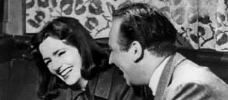
Ninotchka
1939 -
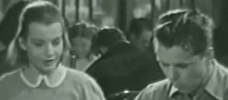
What a Life
1939 -
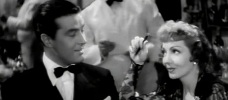
Arise My Love
1940 -
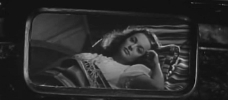
Hold Back the Dawn
1941 -
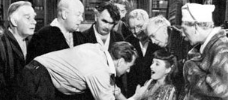
Ball of Fire
1941 -
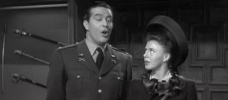
The Major and the Minor
1942 -
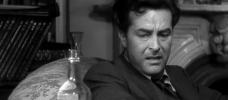
The Lost Weekend
1945 -
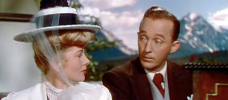
The Emperor Waltz
1948 -
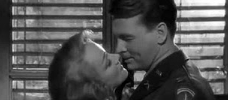
A Foreign Affair
1948 -
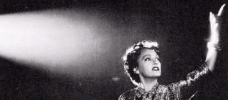
Sunset Boulevard
1950
We don’t do comments anymore, but you may contact us here or find us on Twitter or Facebook.



